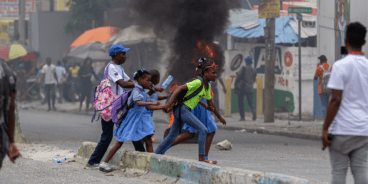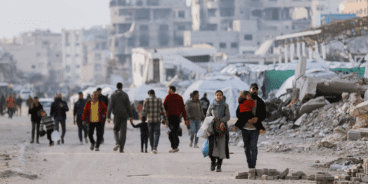Atrocity Alert No. 148: Mali, Yemen and Myanmar (Burma)
Atrocity Alert is a weekly publication by the Global Centre for the Responsibility to Protect highlighting situations where populations are at risk of, or are enduring, mass atrocity crimes.
Ethnic militias, arms proliferation and the massacre in Mali
At least 150 civilians, including 50 children, were massacred in Ogossagou village in the Mopti region of Mali on Saturday, 23 March. Ogossagou is mainly populated by people from the Fulani community (also known as Peuhls), who were targeted in the attack. Traditional hunters called “Dozos” – who come mainly from the ethnic Dogon community – allegedly carried out the attack. The UN Security Council was visiting Mali on the day of the attack and condemned the violence.
According to the UN Office of the High Commissioner for Human Rights (OHCHR) at least 600 people have been killed in inter-communal violence in Mali since March 2018. Many attacks on Fulani villagers in the Mopti region have been attributed to the Dan Na Amassagou militia, an association of armed Dozos self-defense groups, which the government dissolved following Saturday’s massacre. Some Dogon villagers have also been targeted in attacks, including a reprisal attack on the village of Ouadau that killed four people.
While there is a history of inter-communal violence between Fulani and Dogon communities over access to land, water and grazing rights, the recent proliferation of armed self-defense groups has also been linked to the increased activity of armed Islamist groups throughout the Sahel region since 2012. These groups have contributed to the increased flow of weapons across porous borders and have often recruited fighters from the Fulani/Peuhl community, exacerbating inter-communal tensions. According to OHCHR, traditional disputes have become particularly deadly with “entire Fulani communities” being “painted as violent extremists simply because they are Muslim.”
While the dissolution of Dan Na Amassagou is a positive step, the government and UN must immediately investigate the recent massacre and ensure all perpetrators responsible for inciting, directing and committing the attack are held accountable. Mali’s government, with the support of the UN peacekeeping mission in Mali, must increase its security presence in central Mali and strengthen its capacity to protect civilians. The government should also take steps to build trust between Fulani and Dogon communities and prioritize disarmament, demobilization and reintegration efforts in areas where there is an ongoing risk of potential mass atrocity crimes.
Yemen marks 4 years of military intervention and war crimes
On Sunday, 24 March, fighting broke out in Hodeidah, marking the heaviest armed clashes in the port city since a UN-brokered ceasefire went into effect on 18 December. Fighting has also increased in other areas of the country, particularly in Hajjah governorate and in the besieged city of Taiz. Five days prior to the recent outbreak of fighting, on 19 March the UN Special Envoy for Yemen, Martin Griffins, briefed the UN Security Council (UNSC) on the status of the December 2018 “Stockholm Agreement,” noting that despite deadlines being missed with regards to troop withdrawal, the various parties remain committed to the Agreement.
Increased fighting in Hodeidah coincides with the four-year anniversary of the beginning of the Saudi Arabia and United Arab Emirates (UAE)-led coalition’s military intervention in Yemen. Since 26 March 2015 the deteriorating conflict has plunged the country into what the UN now describes as the world’s worst humanitarian crisis. Fighting between Houthi rebels, members of the General People’s Congress and various pro-government forces, as well as airstrikes by the Saudi and UAE-led international coalition, have resulted in the deaths of more than 16,000 civilians. However, various parties to the conflict have inhibited accurate reporting of civilian casualties and the actual death toll is widely considered to be much higher.
After four years of war and foreign intervention, Yemenis remain at risk of war crimes and crimes against humanity. The UNSC-mandated Panel of Experts noted in their January 2019 report that coalition airstrikes and the indiscriminate use of explosive ordinance by the Houthis continue to disproportionately affect civilians and civilian infrastructure. Arbitrary arrest and detention, enforced disappearances and the torture of detainees also continues to be widespread.
All parties to the Yemen conflict should fulfill their commitments under the Stockholm Agreement. This includes upholding the ceasefire in Hodeidah Governorate and the withdrawal of troops in coordination with the UN Mission to support the Hodeidah Agreement. International Humanitarian Law (IHL) must be adhered to at all times and all parties must implement measures to better distinguish between civilian and military targets. In keeping with the Arms Trade Treaty, all UN member states should also immediately halt the sale of weapons to parties to the conflict who routinely violate IHL in Yemen, including Saudi Arabia and the UAE.
Myanmar military units responsible for genocide redeployed to Rakhine State
Clashes between Myanmar’s security forces and the Arakan Army – an armed group seeking greater autonomy for the ethnic Rakhine Buddhist population – leave civilians at risk of potential atrocity crimes. Since fighting broke out during December 2018 more than 16,000 civilians have been displaced in Rakhine State. On 22 March seven civilians were also reportedly killed by artillery fire from government positions.
Recent developments underscore the complex history of ethnicity and conflict in Rakhine State. Rakhine is home to the ethnic Rohingya population, more than 720,000 of whom fled so-called “clearance operations” launched by Myanmar’s security forces in August 2017. Those operations resulted in a systematic campaign of violence against the Rohingya community, including the unlawful killing of civilians, widespread rape, and the razing of nearly 400 villages. Some ethnic Rakhine civilians, working with the security forces, also participated in atrocities committed against the Rohingya during 2017.
Despite the international Fact-Finding Mission on Myanmar documenting that the military’s operations against the Rohingya in 2017 possibly constituted genocide under international law, the government has consistently denied that atrocities took place and has failed to hold perpetrators accountable. This has allowed senior officers and military units that were responsible for atrocities to participate in recent operations. Last month, Amnesty International reported that the same army divisions involved in operations against the Rohingya in August and September 2017 were recently redeployed to Rakhine State to fight the Arakan Army.
The government must ensure that all military operations against the Arakan Army are conducted in strict adherence with international law and do not target civilians. The federal and state governments should also allow access for humanitarian organizations and UN agencies to vulnerable and displaced civilians in Rakhine State.
To ensure accountability for genocide and other atrocities committed in Myanmar, the government should cooperate with international accountability mechanisms, including the International Criminal Court, the Fact-Finding Mission and the new independent mechanism mandated by the Human Rights Council. The government should also take proximate steps towards building a more inclusive society where the human rights of all of Myanmar’s diverse populations are protected, regardless of ethnicity or religion.
Read Next
Related Publications

Atrocity Alert No. 436: Haiti, Myanmar (Burma) and Syria

Atrocity Alert No. 434: Sudan, Ethiopia and the UN Human Rights Council
